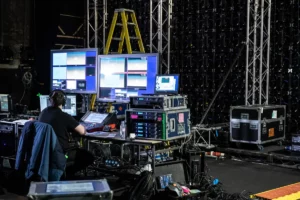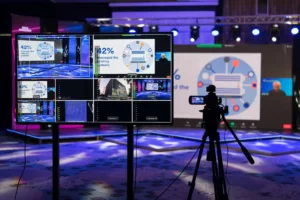At Honest AV, we still receive inquiries from meeting planners asking for quotes or estimates for their upcoming virtual events.
However, it’s essential to understand that virtual events vary widely in complexity—ranging from short, simple webinars to elaborate, multi-day broadcasts with high-end production elements.
Because of this, costs can fluctuate significantly. To ensure an accurate estimate when budgeting your virtual event, it’s crucial to first outline your event’s specific needs and objectives when budgeting your virtual event.
We’ve put together a list of the top 10 factors every meeting organizer should consider to help virtual event producers create a tailored quote that aligns with your event goals and budget.
1. Event Date & Duration
Date: The timing of your event can impact costs, especially during peak seasons or when multiple virtual events compete for the same technological resources. Additionally, last-minute planning may increase costs due to expedited labor or overtime requirements.
Duration: The length of your event plays a major role in determining costs. Many virtual platforms charge based on the number of active event rooms per day. Establishing the total event duration and the number of sessions in advance will help producers estimate bandwidth and staffing needs.
2. Types of Sessions
Are you hosting general sessions, breakout rooms, networking spaces, or workshops? Identifying the variety and format of sessions you plan to offer is critical to understanding the production requirements. Different types of rooms and the number of simultaneous sessions running at once can impact costs, both in platform pricing and labor needed for execution.
3. Audience Size
An estimated attendee count is essential for an accurate quote. Some platforms charge based on the number of participants, while others have capacity limits. Knowing your expected audience size will help you choose the right platform and control costs. Virtual events can attract larger audiences than in-person events due to the ease of attendance, so keep that in mind when estimating.
4. Features & Functionality
What features are essential to your virtual event? Do you need a virtual exhibit hall with multiple exhibitors? Will there be networking spaces, interactive Q&A, or live polling? Consider elements like:
- Audience engagement tools (polls, chats, or Q&A)
- Custom branding or virtual sets
- Fundraising elements or awards presentations
- Registration and ticketing functionalities
- Detailed data analytics for post-event reporting
These functionalities can significantly affect platform choice and overall costs, so be clear about your needs upfront.
5. Production Quality & Visual Style
Production Value: Do you envision a basic, webinar-style event with speakers on camera, or a highly produced, broadcast-quality experience with switchers, transitions, and visual effects? The level of production directly influences both the platform and the crew required.
Visual Style: Are you looking for custom graphics, branded lower-thirds, or high-quality event videos? If so, these elements may require additional investment, but they can significantly enhance the visual appeal of your event.
6. On-Screen Talent
The more on-screen talent you have, the more preparation and coordination are required. Every speaker or presenter will need to participate in rehearsals to ensure a polished presentation, and the production team must test each speaker’s AV setup, internet connection, and comfort with the technology. The number of presenters impacts labor costs, especially for rehearsals and content management.
7. Pre-Recorded Content
Pre-recording content such as keynote speeches, panel discussions, or sponsor messages is a great way to ensure a smooth event. Deciding how much content to pre-record helps producers plan ahead for editing, scheduling, and playback during the event. This can also provide flexibility during live sessions and reduce the risk of technical issues.
8. Sponsor Involvement
If you have sponsors that need to be highlighted throughout the event, consider how you want to showcase them. This could include sponsored segments, virtual booths, or sponsor recognition during key moments. Including sponsors may affect your platform needs and overall budget, especially if you require custom solutions to maximize sponsor visibility.
9. On-Demand Access
Do you need to offer attendees access to the event content after it’s over? Many platforms charge for on-demand hosting, which could include fees for maintaining recordings, offering replay functionality, and extending access post-event. Determine how long you want to keep the content available and who will have access to it.
10. Budget
Finally, be transparent about your budget from the beginning. Providing a clear budget range allows producers to suggest the best options within your price point and propose creative solutions to maximize your resources. Being upfront about financial limits helps avoid surprises later in the process.
Partner with Honest AV when Budgeting Your Virtual Event
At Honest AV, we are committed to helping you budget for your virtual events, select the right platform, and provide top-tier production quality. Our team is dedicated to making sure your virtual event is a success, from planning to execution.















































